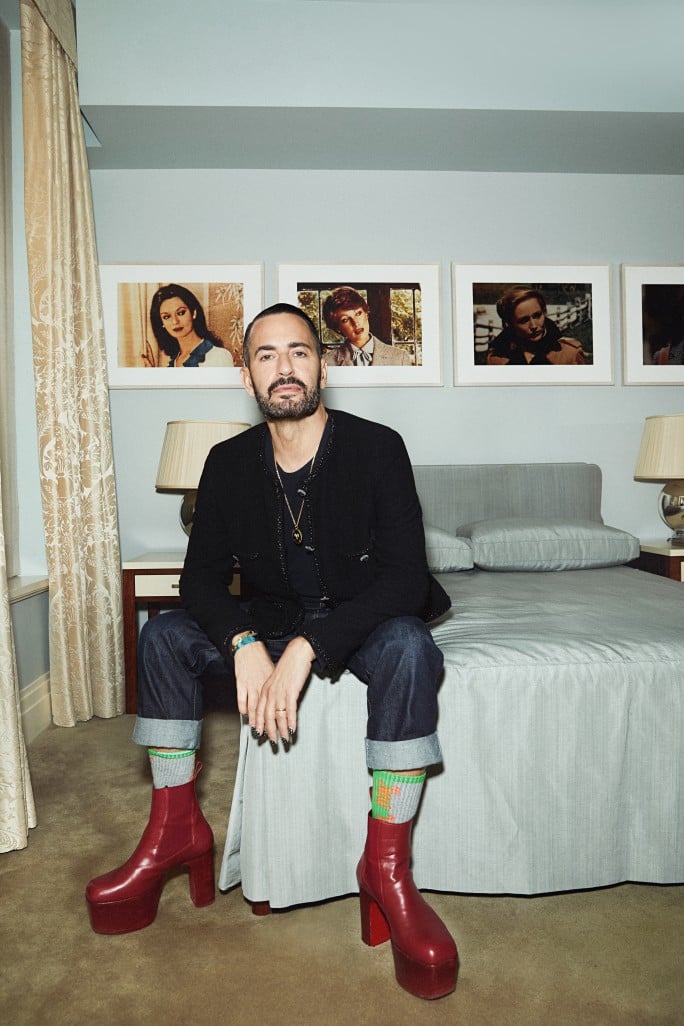Lightning
1976 - Film & Video (Film & Video)
1:23 minutes
Paul Kos
Parked on the shoulder of a single lane highway running through a desert landscape, Marlene looks over her shoulder from inside the car at a fierce storm looming over a distant horizon. Turning her head toward and away from the scene she says, “When I look for the lightning it never strikes, but when I look away it does.” And indeed, the lightning does seem to strike only when she turns away. Before filming Lightning , Paul Kos had done a fair amount of research on lightning, much of it conducted at the lightning research lab at the University of Colorado. He found that in a very good storm it takes about fifteen or twenty seconds for lightning to strike in the same place in the same part of the sky because the atmosphere has to re-ionize. Whether or not one is familiar with the science of storms, Marlene’s repeated deadpan statement seems less like a calculated action and more like a sigh of resignation. Her assured stare dares the viewer to disagree with her perceived reality, despite the fact that lightning can’t be clearly seen until almost halfway through the work. The short length of the film contributes to a feeling of mistrust or disbelief—this blip of a scene could be a glitch, like when one’s brain skips in a moment of déjà vu. Ending abruptly and unresolved, Lighting offers a subtle commentary on truth and fiction, the stories we tell ourselves and others, and perhaps the earth’s indifference to any narrative we might create for it.
Paul Kos works with everyday materials and video to enact a playful conceptual engagement with life and the world. He responds to simple, humble materials and the indigenous elements of specific sites, which he mines for their physical properties and metaphoric possibilities. Throughout these pieces, Kos’s work uses humor to relate the stuff of life back to larger questions of time and spirituality.
Colors:
Related works featuring themes of: » Abstract Sculpture, » Chance, » Color Photography, » Conceptual Art, » American

© » KADIST
Tacita Dean
2001The photographic quality of the film Baobab is not only the result of a highly sophisticated use of black and white and light, but also of the way in which each tree is characterized as an individual, creating in the end a series of portraits...

© » KADIST
Hans-Peter Feldmann
The types of objects Feldmann is interested in collecting into serial photographic grids or artist’s books are often also found in three dimensional installations...

© » KADIST
Hans-Peter Feldmann
The types of objects Feldmann is interested in collecting into serial photographic grids or artist’s books are often also found in three dimensional installations...

© » KADIST
Larry Bell
1979Like many of Larry Bell’s works, VFGY9 deals primarily with the viewer’s experience of sight...

© » KADIST
Will Rogan
2014Will Rogan’s video Eraser (2014) shows a hearse parked in a clearing amidst leaf barren trees...

© » KADIST
Martine Syms
2016Her 2016 video installation quotes the sitcom-as-form and also draws from a 1907 comedic short, Laughing Gas...

© » KADIST
Chadwick Rantanen
2010Telescopic Pole is an adjustable telescopic pole that extends vertically from floor to ceiling and is held up by its own internal pressure...

© » KADIST
John Baldessari
1997In One Must , an image of a pair of scissors, accompanied by the words of work’s title, poses an ominous question about the relationship between the image and the text...

© » LARRY'S LIST
Ed Ruscha
The fashion designer is selling off all the art inside his West Village townhouse at Sotheby’s New York to make way for a new collection....

© » KADIST
Kate Gilmore
2008In the six-minute single-channel video Higher Horse , Kate Gilmore perches herself on top of a tall pile of plaster blocks, in front of a pink colored wall with vein-like streaks of red...

© » KADIST
Félix González-Torres
1992Behind the simplicity and beauty of this untitled photograph of a brilliantly-colored flowerbed by Félix González-Torres are two remarkable stories of love, loss, and resilience...

© » KADIST
Harrell Fletcher
2005The American War , which takes its title from the Vietnamese term for what Americans call the Vietnam War, has toured the United States extensively with the goal of presenting a Vietnamese perspective of that history...

© » KADIST
Andrew Grassie
2009In 2008, Grassie was invited by the Whitechapel Gallery to document the transformation of some of its spaces...

© » KADIST
Francis Alÿs
2006This series of small drawings is executed with varying materials—pen, ink, colored pencil, charcoal, and masking tape—on architect’s tracing paper...






